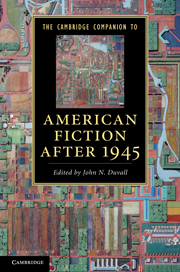Book contents
- Frontmatter
- Introduction: A story of the stories of American fiction after 1945
- PART I POETICS AND GENRES
- PART II HISTORICAL AND CULTURAL CONTEXTS
- 6 African American fiction
- 7 American Indian fiction
- 8 Multiethnicities: Latino/a and Asian American fiction
- 9 American Jewish Fiction
- 10 Feminist fiction
- 11 Southern fiction
- 12 Fiction and the Cold War
- 13 Fiction and 9/11
- PART III MAJOR AUTHORS
- Conclusion: Whither American fiction?
- Index
- Cambridge Companions to …
13 - Fiction and 9/11
from PART II - HISTORICAL AND CULTURAL CONTEXTS
Published online by Cambridge University Press: 28 March 2012
- Frontmatter
- Introduction: A story of the stories of American fiction after 1945
- PART I POETICS AND GENRES
- PART II HISTORICAL AND CULTURAL CONTEXTS
- 6 African American fiction
- 7 American Indian fiction
- 8 Multiethnicities: Latino/a and Asian American fiction
- 9 American Jewish Fiction
- 10 Feminist fiction
- 11 Southern fiction
- 12 Fiction and the Cold War
- 13 Fiction and 9/11
- PART III MAJOR AUTHORS
- Conclusion: Whither American fiction?
- Index
- Cambridge Companions to …
Summary
In the last decade, American fiction has articulated important political, aesthetic, and psychological contexts for understanding the wounds of September 11, 2001. This body of work does so in one of two ways: by directly representing the terrorist attacks or by displacing the attacks historically, allegorically, or metafictionally. This chapter first examines the former representational method before taking up the latter narrative strategy.
Fiction that directly addresses 9/11 and its aftermath focuses almost exclusively on the attack on the World Trade Center. The symbolic impact of the Twin Towers' destruction, televised as it was around the world, has made New York City the nexus of the 9/11 imagination for many novelists as they depict the lives of New Yorkers who were the victims, the survivors, or the witnesses of the devastation. These narratives of individual trauma and loss, however, have been deemed a failure on a number of fronts. Indian author Pankaj Mishra expresses disappointment that American novelists have retreated “to the domestic life” and have struggled “to define cultural otherness” of Islam. Richard Gray notes that much of the American fiction about the terrorist attacks emphasizes “the preliminary stages of trauma.” His assessment, however, echoes Mishra's: American fiction that directly engages 9/11 “adds next to nothing to our understanding of the trauma at the heart of the action. In fact, it evades that trauma” by its focus on domestic issues and personal lives, rather than “facing the [Islamic] other.”
- Type
- Chapter
- Information
- The Cambridge Companion to American Fiction after 1945 , pp. 181 - 192Publisher: Cambridge University PressPrint publication year: 2011

